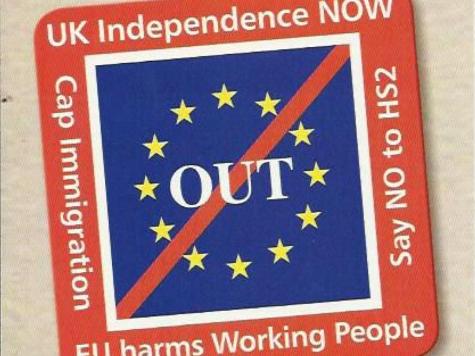Despite last night’s successes for the UK Independence Party, a bad taste may stick in the mouth regarding an attempt to hijack UKIP voters by a disgruntled ex UKIP representative.
Documents seen by Breitbart London reveal that upon discovering that Mike Nattrass had registered “An Independence” Party, claiming top slot on Thursday’s ballot papers, Nigel Farage’s UK Independence Party filed a complaint with the elections regulator in the UK, the Electoral Commission.
The documents reveal a disturbing lack of common sense within the commission, who claimed that “An Independence” and “UK Independence” were sufficiently different enough so as not to confuse voters.
The email said:
On this basis, it was our opinion that the party names ‘An Independence’ and ‘UK Independence Party (UKIP)’ were sufficiently different so as not to be likely to confuse a voter as to who they were voting for. Based on the additional information you have provided and considering this against the scope of the test we must apply under PPERA when considering party names, I do not believe, therefore, that there is sufficient evidence to overturn our original decision allowing the name.
But the fact that Nattrass’s new and hitherto unknown party garnered around 1.5 percent of the vote last night is an indication that this was simply not true. Indeed the party may have cost UKIP an extra member of the European Parliament in the South West of England.
Last night in an exclusive interview with Breitbart London, UKIP leader Nigel Farage said he would vent his feelings about the Electoral Commission today.
An Electoral Commission representative wrote:
The PPERA provides protection of a party’s name and other identity marks against other parties registering the same or confusingly similar name, descriptions or emblems. The scope of the PPERA tests does not extend to, or cover, a comparison between the identity marks of registered parties and independent candidates who are not registered. Accordingly this point you raise was not a relevant consideration in the registration decision.
However, we would accept that that may be a legitimate concern in terms of voter confusion in the wider sense. In that scenario, were a voter to be presented with a choice between a candidate standing for ‘An Independence’ with the party’s emblem used on the ballot paper and an independent candidate without an emblem, we take the view that the presence of the party’s emblem on the ballot paper would mitigate against possible confusion. I can see that it is possible for a candidate who is nominated by ‘An Independence’, who chose not to have the party’s emblem appear next to their name on the ballot paper, to be confused with a candidate with the description ‘Independent’. However, under these circumstances, ‘An Independence’ would lose the benefit that they gain through being registered, rather than gaining any advantage. This would be no different to a situation where the voter is faced with a choice between multiple independent candidates on the same ballot paper, all of whom will be seeking votes through recognition of the candidate name alone.
“An Independence from Europe” are reminiscent of the 1994 European Elections when Richard Huggett ran as a “Literal Democrat” and polled 10,000 votes. The Liberal Democrats lost the European seat and the case was taken to the High Court. Since then rules have been put in place to stop people running under names “deliberately designed to deceive the electorate”.

COMMENTS
Please let us know if you're having issues with commenting.